|
The FOREST SUMMIT 2010
Hosted by
Holyoke Community
College
Eastern Native Tree Society
Free and Open to the Public
HCC Forum (C building)
October 14-15, 2010
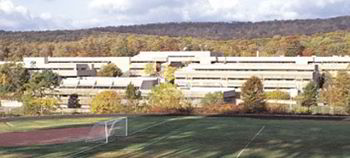
AGENDA
(Tentative)
SUMMIT TIMETABLE
| |
THURSDAY
|
|
| 9:00AM |
Summit Area Open |
Exhibits |
| 9:30 AM |
Introductions |
|
| 10:00 AM |
Dr. Susan Flader |
Keynote Address |
| 11:00 AM |
Dr. David Foster |
Harvard Forest |
| NOON |
Lunch |
|
| 2:00 PM |
Heidi Ricci |
Mass Audubon |
| 3:00 PM |
Bob O'Connor |
Mass EOEA |
| 4:00 PM |
Sharl Heller, et al |
Friends Groups |
| 5:00 PM |
DINNER |
|
| 7:00 PM |
Mary Booth |
Columbia U |
| 8:00 PM |
Chris Matera |
Mass Forest Watch |
| |
FRIDAY
|
|
| 9:00 AM |
Dr. Henry Art |
Williams College |
| 10:00 AM |
Dr. Lee Frelich |
U Minnesota |
| 11:00 AM |
Dr. Jesse Bellemare |
Smith College |
| NOON |
Lunch |
|
| 2:00 PM |
Dr. Neil Pederson |
Columbia U |
| 3:00 PM |
Prof. Gary Beluzo |
HCC |
| 4:00 PM |
Dr. Doug Seale |
Independent |
| 5:00 PM |
DINNER |
|
| 7:00 PM |
Bob Leverett |
FMTSF/ENTS |
| 8:00 PM |
Will Blozan |
ENTS |
October
14, 2010 (Thursday Morning at 9:30 am)
Introductions and Overview
Dr. Susan Fader (Keynote Address)
Professor emerita
of environmental history at the University of Missouri-Columbia
"Aldo Leopold Legacy and Its
Application to a Forest in Missouri "
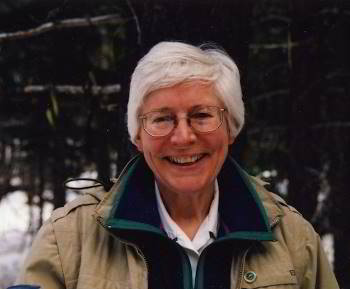
This presentation will explore the
development and implications of Aldo Leopold's concepts of land
health and a land ethic by reference not only to his own experience
as a forester and his restoration of his Wisconsin farm and shack
but also with a focus on a visionary enterprise in Missouri, Leo
Drey's 150,000-acre Pioneer Forest, a working forest now owned by
the L-A-D Foundation.
Susan Flader is professor emerita
of environmental history at the University of Missouri-Columbia. She
has published several books and numerous articles on forester and
wildlife ecologist Aldo Leopold and on forests and parks in
Missouri. She has also served as president of the American Society
for Environmental History, board chair of the Aldo Leopold
Foundation, and president of the Missouri Parks Association.
Dr. David Foster
Director of Harvard
Forest at Harvard University
"Wildlands and Woodlands
Vision "

Dr, David Foster is an ecologist
and director of the Harvard Forest at Harvard University where he
has been a faculty member in the Department of Organismic and
Evolutionary Biology since 1983. He is the author of Thoreau's
Country - Journey through a Transformed Landscape (1999), New
England Forests Through Time (2000; both Harvard University Press)
and Forests in Time - The Environmental Consequences of 1000 years
of Change in New England (2004; Yale University Press). David is the
Principal Investigator for the Harvard Forest Long Term Ecological
Research program, which is funded by the National Science Foundation
and involves more than 50 researchers, 25 graduate students, and 30
undergraduates from across the Northeast investigating the dynamics
of New England landscape.
October 14, 2010 (Thursday
Afternoon at 2:00 pm)
Heidi Ricci
Massachusetts Audubon Society
"Strategies and Techniques
for Bringing Parties Together to Forge Workable Policies "

This presentation will describe
advocacy strategies to protect the role of forests in sustaining
people and nature in a rapidly changing climate. It will include an
overview of Mass Audubon’s new strategy on climate change, status
and trends of forests in Massachusetts, local forests’ role in
climate change mitigation and adaptation. Current public debate and
policy initiatives related to forests and energy will be presented
to illustrate advocacy techniques (persistent, polite persuasion,
founded in science with practical strategies for moving government
policies and initiatives in positive directions in the face of many
pressures and influences).
Heidi Ricci is a Senior Policy
Analyst at Mass Audubon, with over twenty five years of experience
in environmental policy, wetlands regulation and restoration, land
use planning and regulation, open space protection, and public lands
management. She is the primary author of Mass Audubon’s publication,
Shaping the Future of Your Community - A Citizen’s Guide to
Involvement in Community Planning, Land Protection, and Project
Review. She has a B.S. degree in Biology from Tufts University and
an M.S. degree in Resource Management and Administration from
Antioch University New England. Heidi has served on numerous state
advisory committees including the Department of Conservation and
Recreation’s recent Forest Futures Visioning Process.
Bob O'Connor
Massachusetts Executive
Office of Energy and Environmental Affairs (EOEEA)
"Massachusetts EOEEA Vision
Strategies for Implementation"

Sharl Heller and Friends
"How
Friends Organizations Help Preserve Important State Sites"
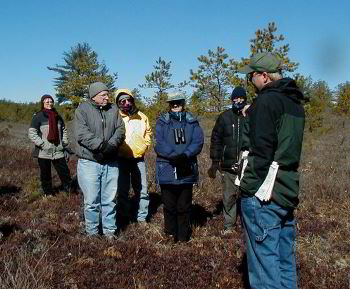
Miles Standish State Forest, MA
Mike Ryan, Melrose, MA
Executive Director Friends of the Middlesex Fells Reservation;
Facilitator for the Massachusetts Forest and Park Friends Network;
Former member of Advisory Group of Stakeholders, Forest Futures
Visioning Process representing citizen forest advocates; MA
economics; former career in Boston area advertising photography;
Former Peace Corps volunteer, Marshall Islands, Trust Territory of
the Pacific Islands
Claudia Hurley, Westfield, MA
A founder and leader of the Friends of Robinson State Park;
Facilitator for the Massachusetts Forest and Park Friends Network;
Former member of Advisory Group of Stakeholders, Forest Futures
Visioning Process representing citizen forest advocates; BA
political science, BA math; former math teacher
Nature enthusiast, particularly as amateur bird watcher, member of
the Springfield Allen Bird Club
Sharl Heller, Plymouth, MA
Founder and President Friends of Myles Standish State Forest;
Facilitator for the Massachusetts Forest and Park Friends Network;
Friends Groups representative on the DCR Off-Highway Vehicle
Enforcement Working Group; BA history; Co owner and Art Agent,
Resonance Fine Art; Former member of the Lincoln Sudbury High
School School Committee and Building Committee member
October 14, 2010
(Thursday Evening at 7:00 pm)
Mary Booth
PhD. in Ecosystem Ecology
“Biomass - The
Unvarnished Truth about it; What the science really tells us ”
This presentation will focus on the implications of biomass
power for forest cutting and carbon emissions, also providing a
critique of the Manomet Study, upon which the State of
Massachusetts has based controversial new regulations
restricting biomass power.
I am
trained as an ecosystem ecologist (PhD, Utah State University)
and had postdoctoral fellowships at the Ecosystems Center at the
Woods Hole Marine Biological Laboratory and at the Earth
Institute at Columbia University. My work has spanned a variety
of systems and scales from microbial ecology in desert soils to
watershed modeling in the Midwest, examining the sources of
nitrogen pollution in the Gulf of Mexico. For the last two years
I’ve been working to bring sanity to renewable energy policy in
Massachusetts and beyond by analyzing the impacts of biomass
power generation. Working with Environmental Working Group, I
authored Clearcut Disaster, an analysis of forest cutting and
carbon emissions from biomass buildout under a federal renewable
energy standard, and have also produced a number of other
analyses.
Chris Matera
Massachusetts Forest Watch
"The Reality of Harvesting Methods
Promoted as Useful to the Public"
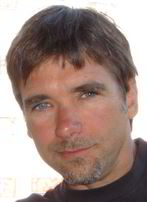
A photographic and graphical overview of
the root causes of the recent public forest logging
controversies, an examination of the newly proposed protections
for Massachusetts public forests, and a look at the future for
Massachusetts and New England forests, including the potential
carbon and forest impacts of proposed bio-energy projects.
Chris Matera is a civil engineer and
the founder of Massachusetts Forest Watch, a citizen watchdog
group formed to protect public forests and promote genuinely
“clean" and "green" energy solutions.
October 15, 2010 (Friday
Morning at 10:00 am)
Dr. Henry Art
Robert F. Rosenburg
Professor of Biology & Environmental Studies at Williams College
"The Beinecke Stand, Hopkins Forest,
Williamstown, MA: The Last 75 years of Old-Growth Woodlot Dynamics"
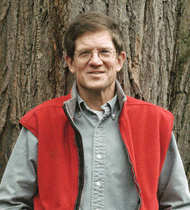
The Beinecke Stand of the Hopkins
Memorial Forest in Williamstown. MA is a 12-acre old-growth woodlot
that was never cleared for agriculture, and survived as an wooded
island in a sea of 18th-20th Century farms. This presentation traces
the changes in the Beinecke Stand over the past 75 years,
interpreting quantitative data from plots established by the US
Forest Service in the mid-1930s and intensively investigated since
the 1970s.
Henry W. Art, The Robert F.
Rosenburg Professor of Biology & Environmental Studies at Williams
College. Taught biology and environmental studies at Williams
College since 1970 when he rejuvenated the Hopkins Memorial Forest
as a field research site. His research centers on the impacts of
past land uses on the successional patterns, growth rates, and
ecosystem functions of a landscape typical of western New England.
He is a past chair of the Biology Department and former director of
the Center for Environmental Studies at Williams. He also serves on
the Williamstown Conservation Commission, the Board of Trustees of
the Conway School of Landscape Design, and is the Vice President of
the Williamstown Rural Lands Foundation.
Dr. Lee Frelich
"Forest and Moose
Interactions on Isle Royale National Park "
University of Minnesota, Director of
the Center for Hardwood Ecology
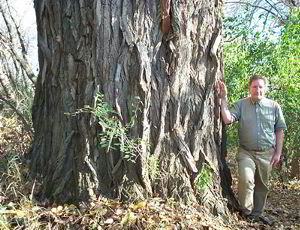
Moose and forest vegetation
interactions have been studied on Isle Royale for 40 years. Moose
have created bonsai forests of balsam fir by consuming most of the
new growth every year and prevented establishment of favored browse
species such as mountain maple and mountain ash. In addition, moose
are far more likely to browse isolated sugar maple saplings than
sugar maple saplings within the maple forest. Thus, they are
probably preventing the advance of maple forest into the spruce
forest which is expected as a result of a warmer climate. However,
moose numbers are now lower than they have been in several decades,
and some of these effects may be reversed in the future.
Lee E.
Frelich is Director of the University of Minnesota Center for
Hardwood Ecology. He received a Ph.D. in Forest Ecology from the
University of Wisconsin-Madison in 1986. Frelich teaches courses in
Forest Fire Ecology and Landscape Ecology on St. Paul Campus. He has
advised 20 graduate students, and is a senior member of the
Conservation Biology, Natural Resource Science and Management,
Ecology, and Invasive Species Graduate Programs. Frelich has
published numerous papers on forest ecology and has been listed
among the top 1% of all scientists in the world in the Science
Citation Index, Ecology and Environment Category. He has appeared in
the news media 250 times including The New York Times, Newsweek,
National Geographic, and many TV and radio stations. Current
research interests include fire and wind in boreal forests,
long-term dynamics of old-growth hemlock and maple forests, invasive
earthworms in forests, and global warming.
Jesse Bellamare
Department of
Biological Sciences at Smith College
"Plant Conservation and
Climate Change: The View from the Forests of the Northeast"
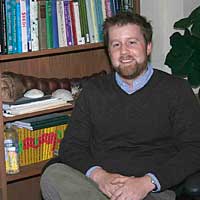
This presentation will consider
some of the likely impacts of climate change on forest
vegetation in the Northeast, with a particular focus on plant
species that reach their distribution limits in the region. The
results of experiments testing the nature of distribution limits
will be reviewed and placed in the context of the biogeographic
and paleoecological history of the region. Options for plant
conservation, up to and including so-called "assisted
migration", will be discussed. Jesse Bellemare is a plant
ecologist in the Department of Biological Sciences at Smith
College in Northampton, MA. Research in the Bellemare Lab
focuses on questions related to seed dispersal, plant community
assembly, and plant conservation.
Jesse Bellemare is a plant
ecologist in the Department of Biological Sciences at Smith
College in Northampton, MA. Research in the Bellemare Lab
focuses on questions related to seed dispersal, plant community
assembly, and plant conservation.
October 15, 2010 (Friday
Afternoon at 2:00 pm)
Dr. Neil Pederson
Tree Ring Laboratory
of Lamont-Doherty Earth Observatory and Columbia University
"The Tale of the Rings:
What do Tree Rings Reveal in the way of Useful Scientific
Information"
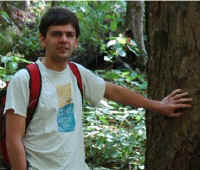
This talk will highlight the
characteristics of old trees that Neil has noticed over the last
15 yrs in the eastern U.S. and highlight some of the new
insights gained from studying these trees. In particular, Dr.
Pederson will focus on past drought history in the eastern US,
regional disturbance history and the potential interaction
between climate and forest ecology.
Neil
Pederson grew up in rural central NY State and spent much time
in the Adirondack Mountains where he gained an appreciation for
nature. Between his B.S. and M.S. degrees in forest ecology, he
worked in the longleaf pine forests of southern Georgia,
hardwood forests of northern Vermont and then forests of
Mongolia, China, Russia before focusing on eastern U.S. forests
for his dissertation. Neil taught at Eastern Kentucky University
for five years in the biology before becoming a research
scientist at the Tree Ring Laboratory of Lamont-Doherty Earth
Observatory and Columbia University. His main research
interest is the interaction between climate and
forest history in diverse, temperate forests.
Prof. Gary A.
Beluzo
Professor of Environmental Science
at Holyoke Community College
"The Autopoietic Forest:
Concepts and Reality ”
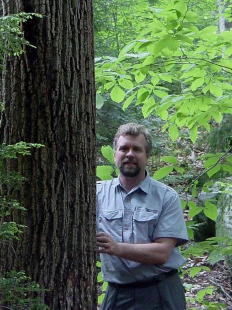
Little River Gorge, MA
We see phrases like: Old Growth
Forest, Primeval Forest, First Growth Forest, Primary Growth
Forest, Virgin Forest, Managed Forest, and Natural Forest. How
are these terms related, and how do we consider and classify our
remaining forested ecosystems? Professor Beluzo suggests a new
way of viewing and classifying forests based on the degree of
naturalness, structural complexity, and to what extent a forest
is "autopoietic". Given the impact of logging, habitat
fragmentation, and the introduction of some 400 pathogens and
exotic species in the U.S., should all forests be "man-aged"?
Gary Beluzo is a Professor of
Environmental Science at Holyoke Community College. He was the
Department Chair for 14 years before returning to full time
teaching and devoting his off-campus time to Old Growth Forests.
Although Gary’s earlier interest was in limnology, he began a
partnership with Bob Leverett in the fall of 1998 to inventory,
characterize, and map with GIS the old growth forests of
Massachusetts with a special permit from the MASS DCR. Through
an NSF Grant in 1996, Professor Beluzo created an Environmental
GIS laboratory at HCC and is now developing an extensive
geo-database of old growth forests and champion trees for
Massachusetts. Gary is also part of a network of scientists
exploring the relationships between various environmental
factors and tree growth in the Eastern United States under the
auspices of the Center for Hardwood Ecology at the University of
Minnesota. Professor Beluzo is the on-campus architect of the
HCC Forest Summit Series which now annually draws scientists and
forest aficionados from throughout the Eastern United States.
Gary A. Beluzo
Professor of Environmental
Science
Holyoke Community College
Holyoke, MA 01040
413 552-2445
gbeluzo@hcc.mass.edu
Dr. Doug Seale
PhD Philosophy
"The History of
Environmental Ethics and Forests”
The presentation focuses on the
ethical and aesthetic choices we face when considering how we
should relate to forest environments and the attitudes which
underlie those choices. Are forests only valuable because we can
use them for utilitarian (i.e. economically profitable)
purposes? Or are there additional values which should and must
be considered? In this presentation, I consider the views of
Aldo Leopold, some early American environmentalists, and others
who have contributed to our understanding of environmental and
ecological values.
Doug is an independent researcher in environmental ethics,
environmental philosophy, and the history of environmental
ideas, which are his areas of special interest. He holds a Ph.D.
in philosophy and teaches Environmental Ethics and other courses
part-time at Framingham State University. He is a frequent
contributor of book reviews for the Journal of Agricultural and
Environmental Ethics. He is a former Board Member of the Friends
of the Assabet River National Wildlife Refuge and was recently
admitted to the Board of Supervisors for the Middlesex
Conservation District
October 15, 2010
(Friday Evening at 7:00 pm)
Robert T. Leverett
Friends of Mohawk Trail
State Forest and the Eastern Native Tree Society
"The
Great Forests of Massachusetts"
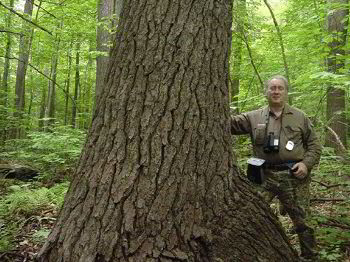
Bob Leverett at Ice Glenn, MA
Bob Leverett
has been described as the "old growth forest evangelist of the
east". His widespread forest meanderings have led to a large
database of tree measurements and an encyclopedic knowledge of the
significant remaining forests of the eastern U.S. This evening Bob
takes us on a visually stunning tour of the "Great Forests of
Massachusetts."
Bob and fellow ENTS co-founder
Will Blozan have pioneered tree measuring techniques that have
allowed ground-based measurements to be accurate to within a foot of
true height. Bob is the President of the Friends of the Mohawk Trail
State Forest, the primary architect of the Eastern Old Growth
Conference series, and co-organizer of the HCC/ENTS Forest Summit
Series. His extensive wanderings throughout the Eastern US
have earned him the title "Eastern Old Growth Forest sleuth". Bob's
recently published book (coauthored with Bruce Kershner) entitled "Sierra
Club Guide to Ancient Forests of the Northeast" will be available at
the Forest Summit.
Robert T. Leverett
Executive
Director of ENTS
52 Fairfield AvenueHolyoke, MA 01040
413 538-8631
dbhguru@comcast.net
Will
Blozan
President of the
Eastern Native Tree Society and Appalachian Arborists
"ENTS goes West: Climbing and
Mapping the World's Tallest Giant Sequoia"
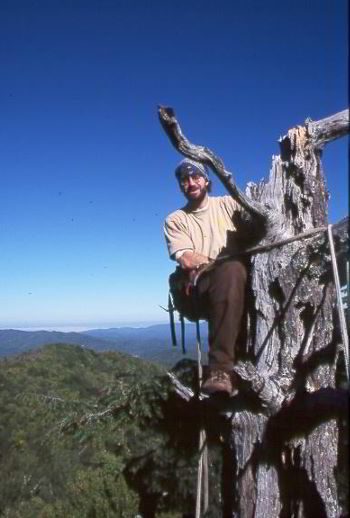
Will Blozan atop the
Gabes Mt. Hemlock in GSMNP, TN
His talk will feature numerous photos and video
from a tree-top perspective as he shares his passion and experiences
in giant trees from coast to coast- culminating with three days
spent in the tallest known giant sequoia.
Will Blozan
is a co-founder and the president of the
Eastern Native Tree Society (ENTS). Will has been a practicing
arborist for over 24 years.
He currently owns his own
business as an arborist in Black Mountain North Carolina.
His passion for climbing and caring
for trees brought him to Great Smoky Mountains National Park in 1993
where he worked on identifying, mapping, and inventorying old-growth
forests. It was during this project that he discovered numerous
champion trees and developed a fascination with old-growth forests.
Will's climbs have helped pioneer arboreal efforts towards the
development of precise survey techniques, including the
documentation of some of the largest specimens of eastern trees ever
recorded. Will Blozan
is a living legend. Will has climbed and documented the tallest
trees in North Carolina, South Carolina, Georgia, Pennsylvania,
Massachusetts, New Hampshire, and elsewhere for both science and
sport. He has been featured in several television documentaries.
He was instrumental in adopting
and refining techniques of western US canopy researchers which has
allowed the ENTS to introduce three-dimensional crown mapping and
volume modeling to eastern trees research. In addition to numerous
eastern big/tall tree climbs Will has been assisting world-renowned
canopy researchers on projects in the giant sequoias of California.
PROGRAM NOTES:
Each evening from
6:30 to 7:00 pm before the Summit speakers begin, a multimedia
presentation will honor the life of Jani Leverett.
The HCC Bookstore
will have copies of Bob Leverett's "Sierra Club Guide to Ancient
Forests of the Northeast" on hand. No credit cards.
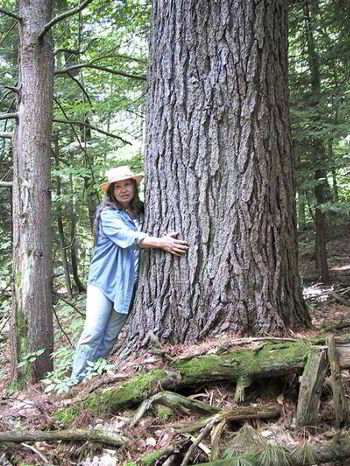
Leverett at the "Jani Pine"
Mohawk Trail State Forest (2001)
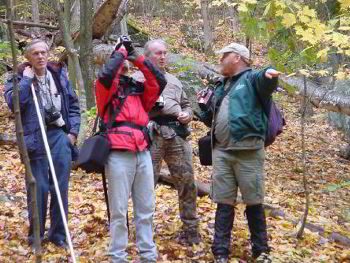
Bob Leverett with fellow ENTS
ENTS Rendezvous 2010
October 16, 2010
10:00am - 9:00pm
Friends of Mohawk Trail State Forest (FMTSF) and the Eastern
Native Tree Society (ENTS) wish to announce a special program at
Mohawk Trail State Forest (MTSF) scheduled for October 16,
2010. The annual Eastern Native Tree Society (ENTS) Rendezvous will
be held on October 16th at Mohawk Trail State Forest (MTSF) from
10:00AM to 4:30PM and continue at the Charlemont Inn from 5:00PM
until 9:00PM.
The daytime event will feature a
climb and modeling of the Jake Swamp white pine, New England’s
tallest accurately measured tree. Will Blozan, President of ENTS,
from Black Mountain North Carolina and Bart Bouricius, a rainforest
canopy structure builder will be making the climb. A short
interpretive walk will follow the climb to showcase some of the
other trees of MTSF, the forest icon of Massachusetts. The walk will
include a discussion of how the trees are measured and the uses made
of the resulting data. Attendees of the conference are invited
witness the tree climb. Meeting place is the headquarters of Mohawk
Trail State Forest. Time is 9:30AM.
Following the climb and interpretive walks, we will
gather at 5:00PM at the historic Charlemont
Inn, Charlemont, MA. Hor d’oeuvres will be featured from
5:00PM until 6:00PM at which time we will have a buffet dinner. If
you plan to have dinner, you must register with the Charlemont Inn.
Contact the Inn. You may also send an email to Robert T. Leverett at
dbhguru@comcast.net registering for dinner.
At 7:30PM there will be a concert celebrating
nature and the trees. Attendance of the concert is free,
though donations are appreciated in whatever amount you are willing
to give. You can donate to ENTS or the Charlemont Inn Preservation
Society. See the accompanying flyer for full information on the
concert.
Music at the Charlemont Inn
Sunday October 16 at 7:30 pm
Fifth Annual Eastern
Native Tree Society Evening of Music, Poetry and Prose
Eileen Ruby,
mezzo-soprano; Benjamin Schwartz, cellist; Tanya Blaich, Monica
Jakuc Leverett, and Christine Olson, pianists; Susan Middleton,
Norma Roche, readers.
Music, poetry and prose
celebrating Nature
The Charlemont Inn,
Charlemont, MA • http://www.charlemontinn.com
Admission free; donations gratefully accepted for
Eastern Native Tree Society and Charlemont Historical Preservation
Society
Hors d’oeuvres at 5 pm; Dinner at 6 pm
$25/person, not including drinks.
Please make reservations by email: dbhguru@comcast.net
Link to
Google map:
http://maps.google.com/maps?q=The+Charlemont+Inn&fb=1&gl=us&hq=The+Charlemont+Inn&hnear=Northampton,+MA&cid=0,0,16822103486595332266&ei=
6VnoS6y7LIXGlQeTp5nlAw&sa=X&oi=local_result&ct=image&resnum=1&ved=0CBYQnwIwAA
|